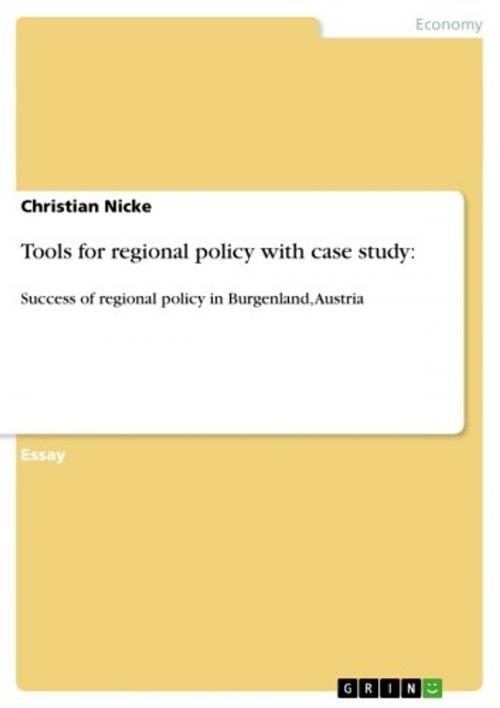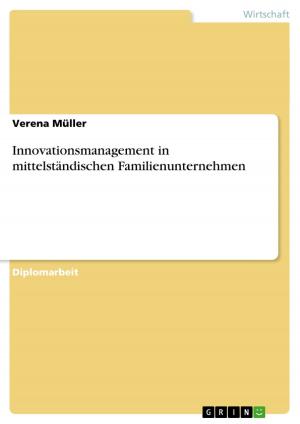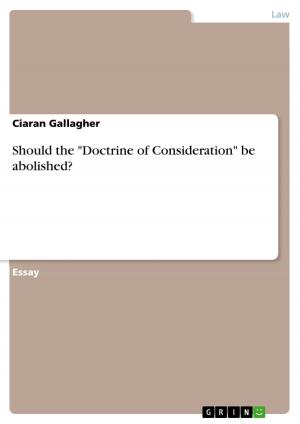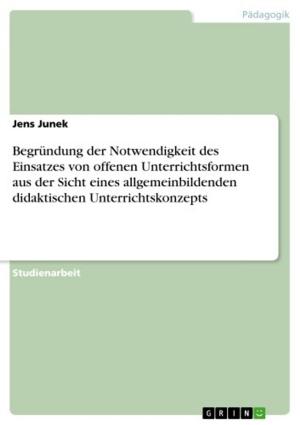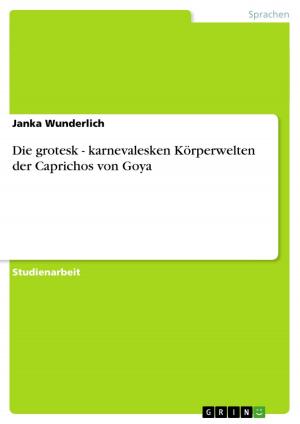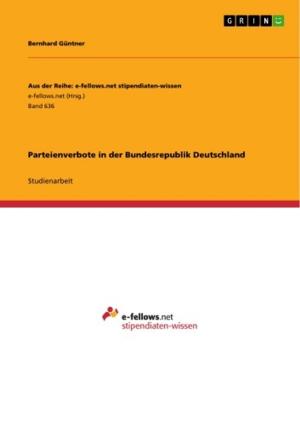Tools for regional policy with case study:
Success of regional policy in Burgenland, Austria
Nonfiction, Social & Cultural Studies, Political Science, Politics, Economic Policy| Author: | Christian Nicke | ISBN: | 9783638870627 |
| Publisher: | GRIN Verlag | Publication: | December 4, 2007 |
| Imprint: | GRIN Verlag | Language: | English |
| Author: | Christian Nicke |
| ISBN: | 9783638870627 |
| Publisher: | GRIN Verlag |
| Publication: | December 4, 2007 |
| Imprint: | GRIN Verlag |
| Language: | English |
Essay from the year 2007 in the subject Business economics - Economic Policy, grade: 5,0 (sehr gut), University of Pécs (Faculty of Business and Economics), course: Public Policy II, 24 entries in the bibliography, language: English, abstract: As first approach to the topic it seems helpful to me to define which factors make a region. In general the literature mentions three ways how regions could be differentiated: •Definition through enumeration, i.e. with examples •Definition in the negative through enumeration of 'non-regions' •Definition on basis if constructive criteria Most common in literature is the last approach, meanwhile the European Union in particular also follows the first possibility for defining the regions within the E.U. As a workable definition of a region the following definition on basis of constructive criteria is suggested: Regions A region is a geographical part of a whole economy that could be identified by means of political and administrative institutions. As constructive criteria a region is defined through free trade between certain regions, mobility of production factors, consistent currency, fiscal and macro-economic policy and shared (superior) institutions. The wider a nations' area is and the more regions a nation contains, the bigger the chance that the regions have different levels of economic development and economic power. The overall development of an economy is the sum of the development of the individual regions, more exactly the sum of individual economies. From this follows that the economic power of the certain regions must be bettered should the macroeconomic development be improved. This cognition lead to the development of a special field of public policy: regional (economic) policies. Regional policy should achieve two major goals: •maximise economic growth and •minimise social costs As I would show in the next chapter, regional (economic) policy includes a number of instruments. From this the definition of regional policy is as follows: Regional policy Regional policy is the sum of law, strategies and measures for setting and influencing a framework and processes in particular areas of a nation through the government. With special regional policy government seeks to reduce spatial disparities in economic.
Essay from the year 2007 in the subject Business economics - Economic Policy, grade: 5,0 (sehr gut), University of Pécs (Faculty of Business and Economics), course: Public Policy II, 24 entries in the bibliography, language: English, abstract: As first approach to the topic it seems helpful to me to define which factors make a region. In general the literature mentions three ways how regions could be differentiated: •Definition through enumeration, i.e. with examples •Definition in the negative through enumeration of 'non-regions' •Definition on basis if constructive criteria Most common in literature is the last approach, meanwhile the European Union in particular also follows the first possibility for defining the regions within the E.U. As a workable definition of a region the following definition on basis of constructive criteria is suggested: Regions A region is a geographical part of a whole economy that could be identified by means of political and administrative institutions. As constructive criteria a region is defined through free trade between certain regions, mobility of production factors, consistent currency, fiscal and macro-economic policy and shared (superior) institutions. The wider a nations' area is and the more regions a nation contains, the bigger the chance that the regions have different levels of economic development and economic power. The overall development of an economy is the sum of the development of the individual regions, more exactly the sum of individual economies. From this follows that the economic power of the certain regions must be bettered should the macroeconomic development be improved. This cognition lead to the development of a special field of public policy: regional (economic) policies. Regional policy should achieve two major goals: •maximise economic growth and •minimise social costs As I would show in the next chapter, regional (economic) policy includes a number of instruments. From this the definition of regional policy is as follows: Regional policy Regional policy is the sum of law, strategies and measures for setting and influencing a framework and processes in particular areas of a nation through the government. With special regional policy government seeks to reduce spatial disparities in economic.
